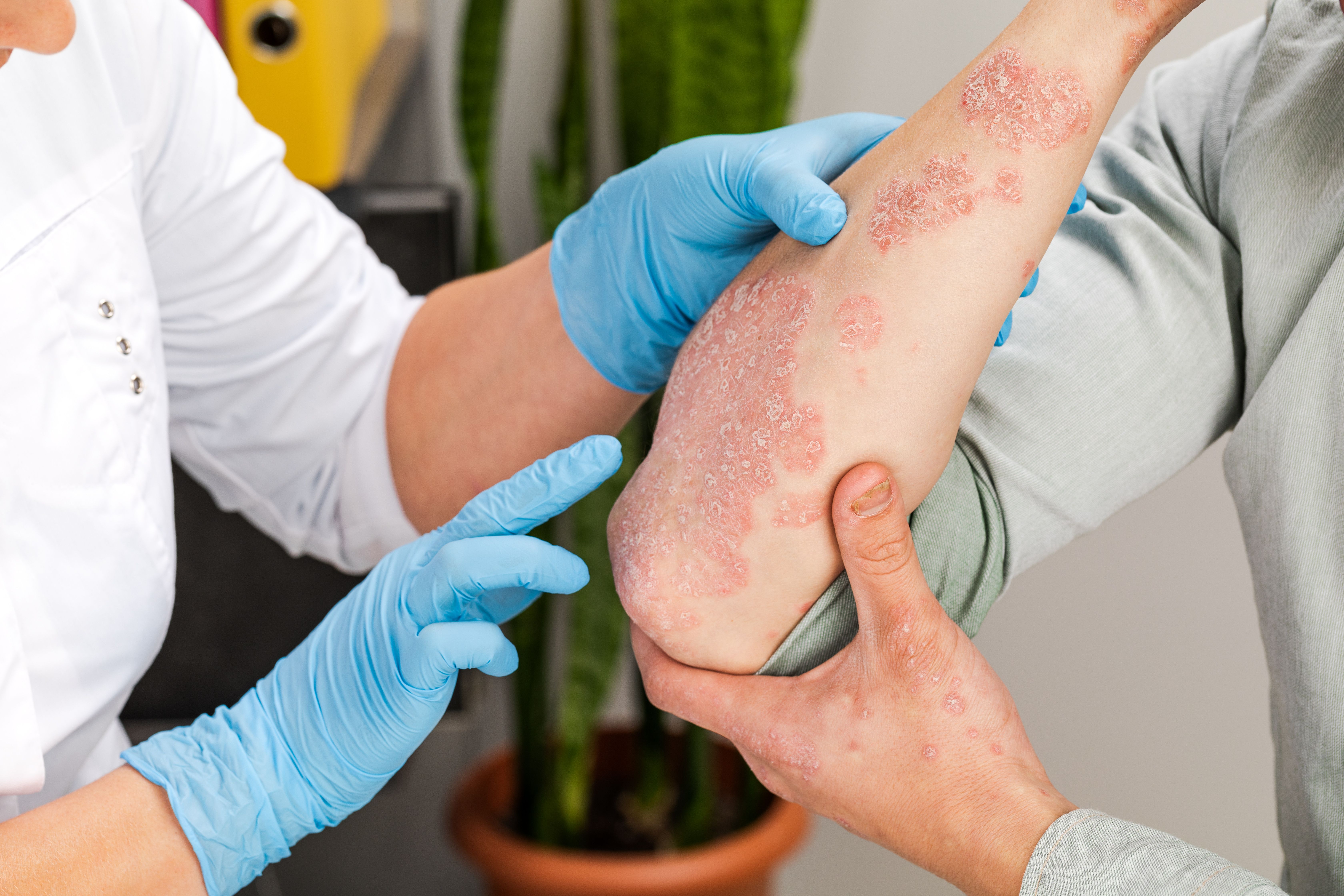- Center on Health Equity & Access
- Clinical
- Health Care Cost
- Health Care Delivery
- Insurance
- Policy
- Technology
- Value-Based Care
Patients, Providers Strongly Favor Oral Therapies in Psoriasis
More than 50% of patients with psoriasis are eligible for systemic treatment, and nearly 90% would switch to an effective oral therapy with a favorable safety profile.
A recently released US dataset from a global study has revealed a striking gap in psoriasis care and a clear preference for highly effective oral treatment options.1 In this study, more than half of adult patients with psoriasis were found to be eligible for systemic therapy, yet the burden on quality of life remained substantial.
More than 50% of patients with psoriasis are eligible for systemic treatment, and nearly 90% would switch to an effective oral therapy with a favorable safety profile. | Image credit: fusssergei - stock.adobe.com

“Psoriasis is much more than skin deep—among its far-reaching effects are a significant disease burden,” said Linda Stein Gold, MD, director of dermatology clinical research at Henry Ford Health and study investigator, in a statement. “We see it disrupt sleep and affect mental health which has a profound impact on the quality of life of patients. This research shows the importance of addressing both the clinical aspects of psoriasis as well as the broader dimensions of daily life, and underscores that patients prefer oral treatments.”
More than 8 million Americans are living with psoriasis, and globally an estimated 125 million people are affected.2 The disease imposes a substantial quality of life burden, in which nearly 60% of individuals with psoriasis say it is a large problem in their everyday lives. This condition is also linked to higher rates of comorbidities, including cardiovascular disease, stroke, metabolic syndrome, and depression.
The ENCOMPASS study was a multinational, cross-sectional survey designed to assess the unmet needs, treatment preferences, and disease burden among people living with psoriasis, as well as the perspectives of dermatology providers.1 Conducted in the US and several other countries, the study included 400 adults and 200 adolescents diagnosed with psoriasis, along with 200 dermatologists who regularly manage the condition.
Participants completed structured online questionnaires capturing demographic and clinical data, treatment history, satisfaction with current therapy, and preferences for future treatment options. Dermatologists provided insights into clinical decision-making, patient management strategies, and perceptions of current and emerging therapies. The study used descriptive and comparative statistical analyses to identify patterns in disease severity, treatment eligibility, and gaps in care, with a particular focus on patient and provider preferences for oral systemic therapies with strong efficacy and favorable safety profiles.
The study revealed 55% of adults and 62% of adolescents reported a “very large” or “extremely large” impact of psoriasis on their quality of life. Both patients (50.5%) and dermatologists (47.5%) indicated a preference for oral therapies over topicals or injectables, citing convenience and ease of use. Among patients currently on injectable treatments, 91.2% said they would be willing to switch to an oral medication if it offered comparable efficacy and safety. Providers echoed this sentiment, with 85.5% expressing interest in prescribing oral therapies that deliver high efficacy alongside a favorable safety profile.
These findings underscore a shared desire for more accessible, effective, and well-tolerated treatment options in psoriasis care.
“Delivering on our commitment to understand the expectations of patients and health care providers involves actively seeking input, responding to feedback, and continually building a more patient-centered approach to care,” said Meredith Hans Moore, vice president, global medical affairs immunology, Johnson & Johnson Innovative Medicine, in a statement. “These initial study findings uncover important insights around the unmet need that remains for oral psoriasis therapies that meet patients’ clinical and daily life needs.”
References
1. New study reveals substantial unmet need in psoriasis, shows strong patient and provider preference for highly effective oral treatments with favorable safety profile. News release. Johnson & Johnson. October 27, 2025. Accessed October 27, 2025. https://www.jnj.com/media-center/press-releases/new-study-reveals-substantial-unmet-need-in-psoriasis-shows-strong-patient-and-provider-preference-for-highly-effective-oral-treatments-with-favorable-safety-profile
2. Psoriasis statistics. National Psoriasis Foundation. Updated December 21, 2022. https://www.psoriasis.org/psoriasis-statistics/
Psoriasis as an Inflammatory Disease, and What’s Changed Over Time
August 3rd 2021August is National Psoriasis Awareness Month, and on this episode of Managed Care Cast, we bring you an excerpt of an interview with a New Jersey dermatologist about the changing concept of psoriasis as more than just a skin disease.
Listen
